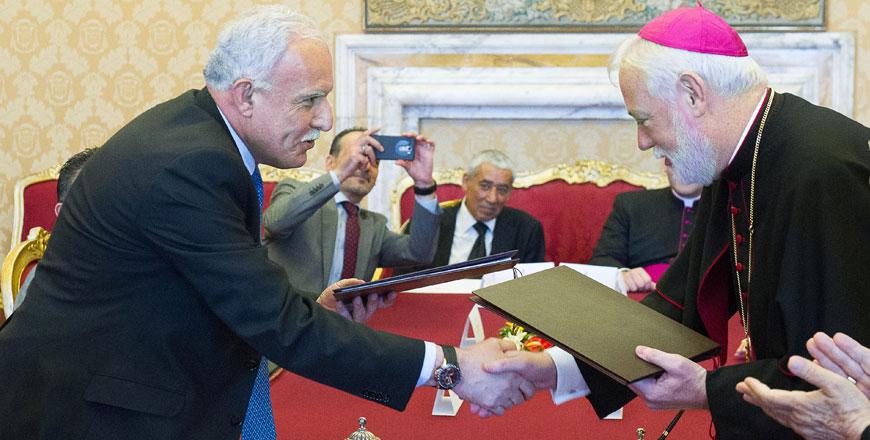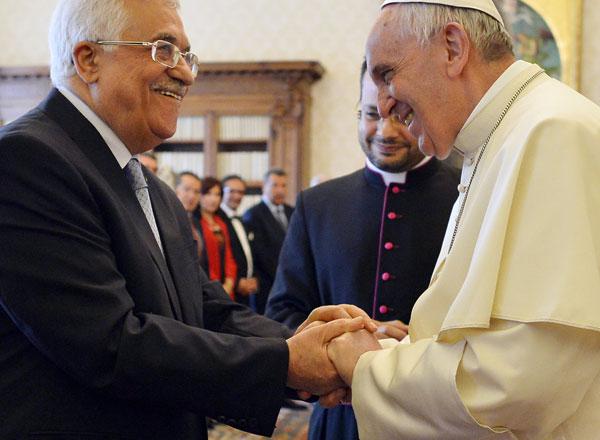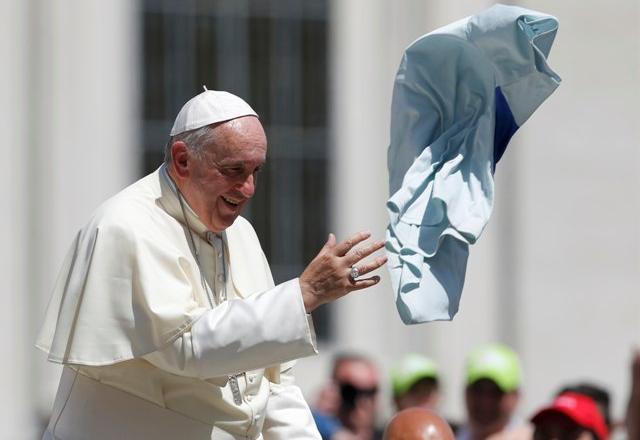You are here
Vatican signs first treaty with Palestine; Israel angered
By Reuters - Jun 27,2015 - Last updated at Jun 27,2015

Vatican’s State Relations Secretary Paul Richard Gallagher (right) shakes hands with Palestinian Foreign Minister Riad Al Malki after signing a Vatican-Palestine territories accord at the Vatican on Friday (AFP photo/Osservatore Romano)
VATICAN CITY — The Vatican signed its first treaty with Palestine on Friday, calling for "courageous decisions" to end the Israeli-Palestinian conflict and backing a two-state solution.
The treaty, which made official the Vatican's de facto recognition of Palestine since 2012, angered Israel, which called it "a hasty step [that] damages the prospects for advancing a peace agreement".
Israel also said it could have implications on its future diplomatic relations with the Vatican.
The accord, which concerns the Catholic Church's activities in areas controlled by the Palestinian Authority, also confirmed the Vatican's increasingly proactive role in foreign policy under Pope Francis. Last year, it brokered the historic resumption of ties between the United States and Cuba.
Archbishop Paul Gallagher, the Vatican's foreign minister, said at the signing that he hoped it could be a "stimulus to bringing a definitive end to the long-standing Israeli-Palestinian conflict, which continues to cause suffering for both parties".
He called for peace negotiations held directly between Israelis and Palestinians to resume and lead to a two-state solution. "This certainly requires courageous decisions, but it will also offer a major contribution to peace and stability in the region," he said.
Palestinian Foreign Minister Riad Al Malki said he hoped it would help "recognition of the right of the Palestinian people to self-determination, freedom and dignity in an independent state of their own, free from the shackles of occupation".
The Vatican is particularly keen to have a greater diplomatic role in the Middle East, from where many Christians have fled because of conflicts in Syria, Iraq and other countries.
There are about 100,000 Catholics of the Roman and Greek Melkite rites in Israel and the Palestinian territories, most of them Palestinians.
Gallagher said the agreement "may serve as a model for other Arab and Muslim majority countries" with regard to freedom of religion and conscience.
The UN General Assembly adopted a resolution in 2012 recognising Palestine as an observer non-member state. This was welcomed at the time by the Vatican, which has the same observer non-member status at the United Nations.
Since then the Vatican has de facto recognised a "State of Palestine" and the Pope referred to it by that name when he visited the Holy Land last year.
Some 135 members of the United Nations recognise Palestine, nearly 70 per cent of the total. By comparison, 160 of the UN's 193 members recognise Israel.
Last October, Sweden became the first major European country to acknowledge Palestine, a decision that drew condemnation from Israel and has since led to tense relations between the two.
The European Union as a whole does not recognise Palestine, taking the same view as the United States that an independent country can emerge only via negotiations with Israel, not through a process of unilateral recognition.
Related Articles
Pope Francis met Palestinian President Mahmud Abbas on Saturday, calling him “an angel of peace”, days after the Vatican said it was preparing to sign its first accord with Palestine to the anger of Israel.
UNITED NATIONS — The Palestinian observer mission to the United Nations on Wednesday appealed to the world body's 193 member states to suppo
The Vatican said Wednesday it was preparing to sign its first accord with Palestine, two years after officially recognising it as a state.


















